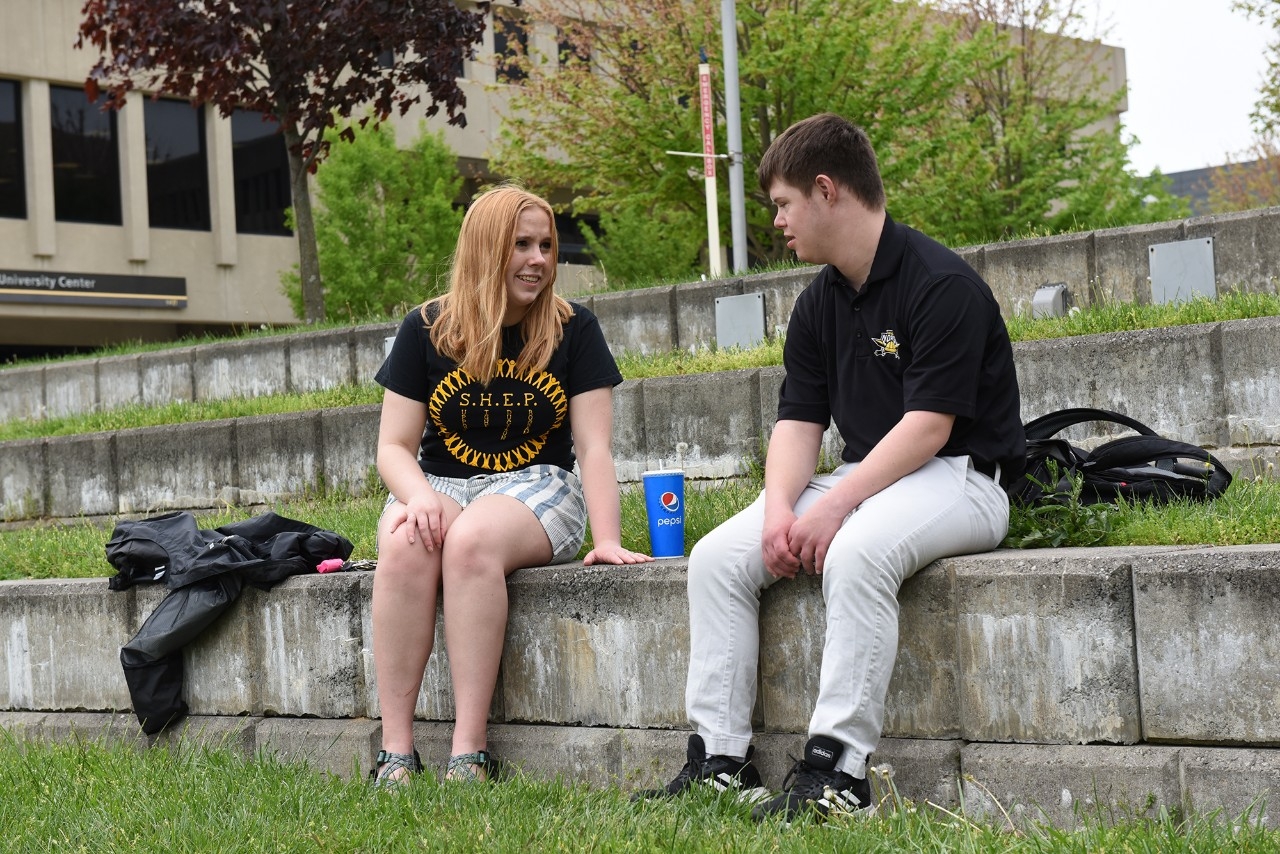
The Supported Higher Education Project (SHEP) started with just one student who desired to have an on-campus college experience.
“It started very grassroots,” says Emily Hellmann, SHEP coordinator. “Dr. Missy Jones worked with his teacher and his school to make it a reality.”
The program, designed for students who have an intellectual or developmental disability, is a three-year comprehensive transition program housed in Northern Kentucky University’s College of Education.
“We really do strive to make this an integrated program where students can have the college experience that any other NKU student has,” Hellmann says. “Students come to us for a variety of reasons. For some, maybe it’s more of the social aspect—meeting new friends, having those college memories and experiences. There's hope and intention of preparing students for the workforce by providing opportunities that would allow them to develop the skills, knowledge and experiences needed during their time on NKU’s campus, which in turn would prepare them for entering workforce once they graduate from the program.”
Most of the students who are interested in SHEP have completed high school and may not be able to pursue higher education through the typical channels.
SHEP allows them to be non-degree seeking, but any credit they accrue during their time at NKU follows them and can be applied to a degree or certificate. Students can take up to 36 credit hours while they’re at NKU.
In addition to taking classes, SHEP students can also gain real-world experience through internships.
Hellmann, who oversees the day-to-day operations of SHEP, spends much of her time helping students feel supported and comfortable with their schedules and creating mentoring plans for each student. She also works closely with faculty who have SHEP students in their classrooms.
“Part of my job is learning more about the student, what their interests are, what their strengths are, what type of job they think they may like to have in the future and then helping them find work experiences either on campus or in the community,” she says. “They're building their resume, making professional connections and hopefully entering that line of work after SHEP. We talk about the student’s short- term and long-term goals, their interests and strengths and then how all of that helps prepare them for their future.”
Hellmann encourages students to join clubs and student organizations, but the program allows them to navigate independently and follow their own schedule.
SHEP allows students like Mallory Borden to have an in-person college experience she wouldn’t have elsewhere.
“I went to online classes at Gateway for early childhood education, where I earned a certificate. But I wanted to be on a college campus, get involved and meet people. SHEP offered the opportunity with the support I needed,” she says. “It’s been very positive. I feel welcomed and supported. I’m really grateful for SHEP and all of the people, resources and activities that have made my experience at NKU a very positive and memorable one.”
Borden is passionate about working with young children and currently works as a teacher aide at Little Stars Preschool on campus. She also earned a micro-credential in ASL during her time in SHEP.
The success of the program is possible due to the help of Hellmann’s team of graduate assistants. There are also 20-30 peer mentors every semester who support SHEP students.
“Our peer mentors are really the ones who are supporting students on a day-to-day basis. They’re providing academic support in class. They’re studying with students outside of class. They might be eating lunch together at the Votruba Student Union,” she says. “We're always looking to make connections with various colleges and departments across campus in order to recruit more peer mentors who are providing support to our students. I think the more we're able to get the word out about SHEP and the more peer mentors we have volunteering and providing support, the more our SHEP students and our peer mentors are able to benefit from that mentoring partnership.”
Mason DeBerge, who grew up in Erlanger, Kentucky, joined SHEP because he needed help with doing schoolwork. He was able to make connections with support from peer mentors.
“I stayed with SHEP because I got to make new friends,” he says. “I've had a fun experience so far on campus by meeting new people and meeting new professors.”
And now DeBerge wants to pay it forward by becoming a peer mentor and helping new people navigate their way across NKU’s campus.
For Hellmann, SHEP provides an irreplaceable experience for students in the region and creates a partnership that allows for individual and community growth.
“The students’ experience and the different opportunities that are available—the academic experience, getting involved in the NKU community, their internship experience—is the heart of what this program is able to offer. Everything that we do, and everything that I do, is looking through the lens of, 'How we can remove barriers and obstacles that prevent students from being fully included in the campus community?' These students have so much to offer and to give to the NKU community. These students—with their strengths and interests and abilities—are really able to offer and give so much more back to the people that they meet and interact with on campus. I think that is where a beautiful partnership can exist."

Editor, NKU in View
Assistant Director, University Communications